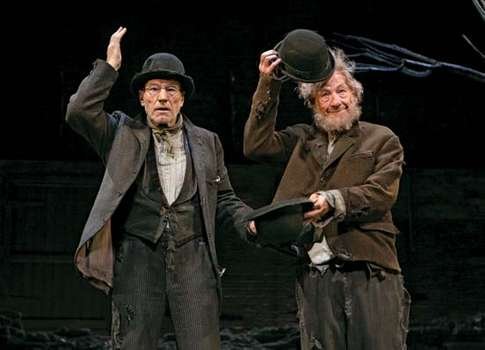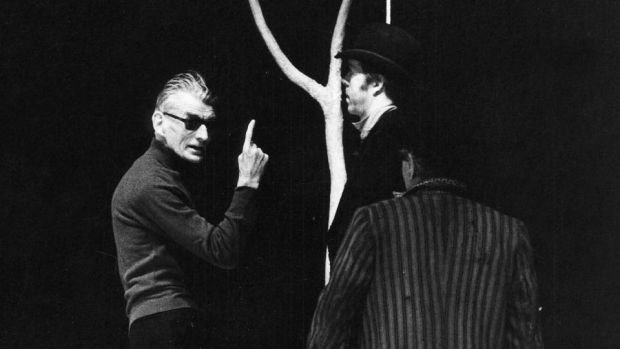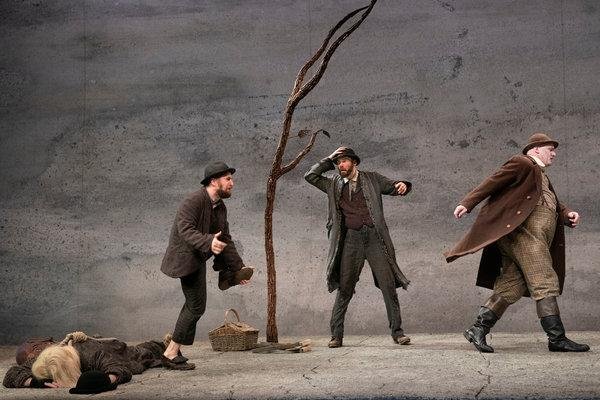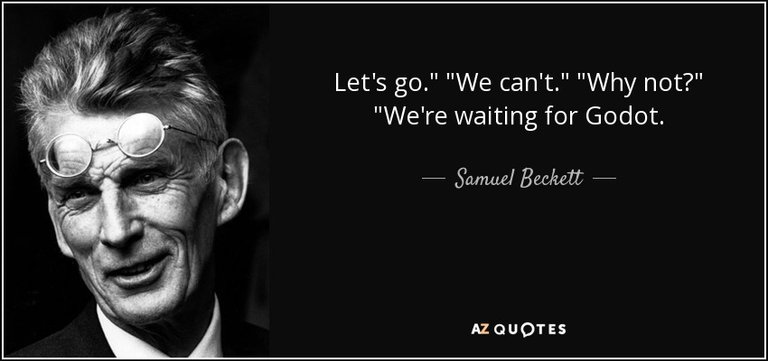
We’ve talked, in the past, quite a lot about literature. But looking back at all the topics we’ve covered, I realize, with dismay, that there is one field of writing, a field that is very dear to me, which we’ve ignored almost completely. I’m talking, of course, about theater. While we have talked a little about William Shakespeare’s plays, we haven’t really explored much else and it seems a shame… There is such an incredible, vast array of plays and theater writings out there. And I think it’s time we delve into that world.
Last time, we had a look at Tennessee Williams’ The Glass Menagerie and I promise you, we will come back to Mr. Williams a little later on, but for now, I think it’s time we tackle the "most significant English language play of the 20th century". Yes, I’m talking about Samuel Beckett’s masterful Waiting for Godot.
Now, 'Waiting for Godot' appears to be a very simple play, perhaps the simplest. There is barely any setting – the two main characters, Estragon and Vladimir spend the entire play waiting on a country road, by one single tree, where they’re supposed to meet an unseen character named Godot. The dialogue again, appears simple, even though it’s full of potential and can be interpreted around various subjects.
Let me give you a brief run-down of the main events. The play begins with Estragon trying to take off his boots,
ESTRAGON: (giving up again). Nothing to be done.
VLADIMIR:(advancing with short, stiff strides, legs wide apart).I'm beginning to come round to that opinion.
This brief exchange, even though it’s spoken in relation to Estragon’s boots, will come to define the play and the characters’ outlook toward life. Throughout, Waiting for Godot is a struggle against the hopelessness of day-to-day life that is slowly embracing the two characters.
They would leave, but they can’t, because they promised to wait for Godot by the tree. To pass the time until Godot arrives, the two tell stories and discuss various topics. At one point, they even contemplate hanging themselves from the tree, but then abandon the idea, for fear one of them might be left alone, without the other.
Their boredom is briefly interrupted by the arrival of Pozzo and his servant, Lucky. Estragon and Valdimir – nicknamed Gogo and Didi – mistake Pozzo for Godot. After this is cleared up, Pozzo sits down to eat, ordering Lucky around and making him dance and then “think” to entertain them. The three talk for a while and then, Pozzo and Lucky leave.
A boy arrives and informs the two that Godot will not be coming today, but could they come again tomorrow and wait for him?
They decide to leave, thought neither makes a move as the curtain falls and thus ends the first act.
The second act is very similar, action-wise, to the first. Again, Didi and Gogo wait by the tree for Godot. Again, they struggle to pass the time. Curiously, Estragon doesn’t remember waiting the day before and Vladimir has to remind him, re-constructing his identity through memories.
Again, Pozzo and Lucky arrive, only now, Pozzo is blind and Lucky is mute. Pozzo runs into Didi and Gogo and falls on the ground. The two refuse to help him up for fear that if they do, Pozzo and Lucky will leave again and they will be left alone. Pozzo can’t remember meeting the two either,
POZZO: I don't remember having met anyone yesterday. But tomorrow I won't remember having met anyone today. So don't count on me to enlighten you.
In the end, they do try to help him up, fail and fall on the ground with him. They get up, eventually, Pozzo and Lucky leave and Didi and Gogo are once more left alone.
A boy enters – again, though claiming to be a different boy, who doesn’t remember ever meeting Didi and Gogo – and tells them that Godot will not be coming tonight either.
VLADIMIR:
Well? Shall we go?
ESTRAGON:
Yes, let's go.
They do not move.

Ian Mckellen and Patrick Stewart - source
Now, the play is deceivingly simple, which makes it in fact so very difficult. There have been dozens of interpretations on Beckett’s words, throughout the sixty-six years since the play first premiered. And the author has not contributed much to the way we actually understand the play. Multiple times, Beckett refused to define the meaning of the play or explain where he got his title.
A popular story says that Beckett encountered two men watching the Tour de France, and when asked what they were doing, one of them replied ‘Nous attendons Godot.’ (We are waiting for Godot) – very possibly a reference to French cyclist, Roger Godeau.
But there’s no way of knowing whence Godot came from. It’s possible the word ‘Godot’ stems from the French word ‘godilliot’ , which refers to a thick war-time boot (remember, boots are featured in the play and Beckett did serve in the war).
Another popular theory claims that it’s a reference to God and that the whole play is about two sinners awaiting their savior, but Beckett was quick to refute that claim, saying
if by Godot I had meant God I would [have] said God, and not Godot.
He also pointed out that he originally wrote the play in French, and whereas Godot and God have an obvious likeness in English, Godot and Dieu, the word for ‘God’ in French, do not.

Beckett himself directing 'Waiting for Godot' - source
‘Waiting for Godot’ is a very difficult play to pin down, as was Samuel Beckett himself, as a writer. He didn’t really belong to any one genre or school of thought. Perhaps if he had, we could understand ‘Waiting for Godot’ more easily.
Many times, the play has been produced as political satire, tackling various subjects, from war to slavery. It has also been viewed as a commentary on religion (obviously) as well as an autobiographical play, reflecting Beckett’s relationship to his wife, Suzanne Dechevaux-Dumesnil.
To me, ‘Waiting for Godot’ is a play about being human, it’s about boredom and desperation, about the absurdity of life. It’s about hopelessness, as I said earlier. Through most of the play, Didi and Gogo are struggling to find ways to pass the time until Godot arrives. But Godot is never meant to arrive, we don’t even know if he’s coming at all. Maybe waiting for Godot is an invention in itself, just another way to kill some time… An interpretation I found interesting suggested that Lucky is thus named because he truly is lucky. He’s the only character in the play who doesn’t need to concern himself with his own actions, doesn’t need to find a way to pass the time himself, because Pozzo always tells him what to do.
Choices are a important factor of the play. Lucky, it seems, is not given a choice. But are Didi and Gogo? Many times, they decide to leave the stage, yet they can’t. Whether they actually can not, or it is their choice not to go, is up to you, the audience. But it’s an interesting question to ponder – is one truly responsible? Is deciding to do something enough? And aren't we all waiting for something that might never arrive?
But regardless how you interpret and stage it, there’s no doubt that the play itself is beyond strange. The text is curious, often leaving the audience wondering what is happening.
You’ve probably heard the term ‘the theatre of the absurd’. It’s still a popular style today and it has inspired countless modern playwrights, screenwriters, and other artists. The term itself was coined by critic Martin Esslin, in reference to Beckett, Ionesco, Pinter and other ‘absurdist’ playwrights. And apparently, Beckett’s play was the first of its kind and a pioneer of this genre that still mesmerizes audiences today.
So, what about you? Have you seen/read ‘Waiting for Godot’? What did you think?
Authored by @honeydue
Original Thumbnail Pic
References: 1 2 3 4 5
Click on the coin to join our Discord Chat

Witness proposal is here:
Go To Steem Witness Page
In the bottom of the page type: adsactly-witness and press vote.

Use small letters and no "@" sign. Or, click here to vote directly!
Thank you!



Thanks for this.
I grew up attending theatre with my parents, and living in L.A., the local PBS station, KCET, having ready access to exceptional actors in town, regularly produced amazingly good teleplays.
I've not yet managed to see "Waiting for Godot" live, but I've always wanted to, and the production with Ian McKellen and Patrick Stewart must have been among the best. I've long loved both actors.
Another absurdist play I've always loved is "The Lady's Not for Burning, " by Christopher Fry, which has a rich and convoluted plot that, in the end, turns out to be far simpler than at first it seems.
There is a version on DVD with Kevin Branagh, which is good, but there is an earlier version produced by KCET in 1974 that was far better, starring Richard Chamberlain, Jacques Aubuchon, Eileen Atkins, John Carradine and a young Kristoffer Tabori, with the rest of the cast equally impressive, though lesser known.
The play was so good that my mom, my sister and I watched it nearly every time it was televised, and we were always glad we had. It is set in medieval times, about a war worn soldier who wants to die, and an accused witch who wants to live. It is dark comedy at its best.
Around the same time, though likely a year or so later, we saw Fry's play "Ring Round the Moon" on stage starring Michael York, who of course played D'Artagnan to Chamberlain's Aramis in the 1973 Alexander and Ilya Salkind film version of "The Three Musketeers."
We saw Chamberlain himself live in a number of plays, as he was a regular on the L.A. and Broadway stage, and he was always excellent.
He gave the most nuanced performance I've ever seen of the lead role in "Cyrano de Bergerac."
Years later, after moving to Florida, I saw him star in "The Sound of Music," and was disappointed that he seemed mostly tired and over it all, giving a half-hearted performance; far from what I'd come to expect from him on stage.
Hopefully, I just caught him on an off night, though he died not too long afterward.
RIP to a truly fine actor.
Yes, the McKellen/Stewart production of Godot must've been spectacular - I'm a huge fan of both, too. :)
I really encourage you to go see Godot, if you can :D Or even reading it is pretty hectic (and fun!)..
I had not heard of 'THe Lady's not for Burning', but I will check it out soon - I love the theater of the absurd, it's so fascinating, while at the same time mind-boggling.
Wow, that is quite a recommendation. To be fair, I've never been a Branagh fan, so... As for Richard Chamberlain, I only think I've seen a few movies with him, sadly neither this nor 'The three musketeers', though I heard that was amazing. I've got to see that sometime :D
Maybe you caught him in a bad mood, in The Sound of Music? Happens...and if you say he was great in the others, then something else must've been the problem...:)
Thank you for taking the time to read and comment! :D
Waiting for Godot has always seemed to me, along with The bald singer of Ionesco, the best expressions of the theater of the absurd. And Beckett, both as a playwright and as a novelist, I appreciate him as one of the most acute and dense English-language writers of the twentieth century, ironically dealing with central issues of the human condition and modern being. The thesis that proposes the interpretation of Godot as God, beyond the fact that Beckett does not approve it, is very acceptable, because, in short, Estragon and Vladimir are waiting for the meaning of their lives. And we know that God is one of the main ways in which meaning is expressed for human thought (on this is reflected, among others, by the critic George Steiner in his book Real Presences and Nostalgia for the Absolute). Even 60 and so many years after its publication, it is a work with complete validity and of great interest.
Thank you for your good post, @honeydue. Greetings.
Yes, Ionesco is definitely someone we will be addressing in this series, both with The bald soprano, as well as other plays of his. The two were veritable rivals for the title of 'father' to the theater of the absurd and both wrote fascinating, though very different plays.
I agree, Gogo and Didi are desperately looking for some meaning, which might as well be God. I don't know how much Beckett disagreed with that interpretation itself or with the idea that he intended it to seem religious (which obviously, he did not).
Thank you for the comment!:)
I have never seen Waiting For Godot, thank you for breaking it down. I have done surreal plays such as The Birthday Party by Harold Pinter and One Man, Two Guvners, which is an adaptation of a servant of two masters.
Posted using Partiko iOS
Oh cool, you're an actor? How awesome! I've read 'A servant of two masters', though haven't seen it :D Pinter, we're going to be featuring in this series a bit later on, so I hope you enjoy that as well! Thank you for commenting :)
Not an actor, but a sound technician :)
Posted using Partiko iOS
Oh that's awesome! must be a really cool job :)
One of the plays I want to play. A story that in my opinion must be addressed as a deep reflection on everything that seems irrational. I am including absurd things and I really enjoy it.
When I was active in theater, I played End games. and it was my last performance around several cities, such as Semarang and Solo before finally vacuuming from the theater after attending the European Asian Artist Summit in Bali.
I like the story of absurdity because it invites us to reflect deeper on whether it is true that there is and is not a unity.
Thank you @honeydue
Thank you @adsactly
thank you Steemit
Warm regard from Indonesia
You acted? How interesting, I had no idea :) Pity you don't anymore, as it's such a beautiful endeavor, both for the feeling itself and also because it exposes you to great plays :D Yes, 'Endgame' is another Beckett classic and I would have written more on that as well, but then, I think these posts would run too long. So maybe in another post,as it's a really interesting play :)
Thank you for commenting!
Excelente trabajo, recopilando la obra de Esperando a Godot de Samuel Beckett, perteneciente a lo que llaman teatro del absurdo.
Hi, I'm a member of @SnaxTeam team.
Snax is a blockchain platform. It was created for people to receive rewards for their social activity (tweets, Steem posts, and so on) and to make instant free micropayments without leaving their favorite social platform. Developers can use Snax blockchain to create decentralized social applications (social dApps).
Today we launched Publisher Rewards for STEEM, After the first scoring round Snax distributed roughly 366’000 $SNAX #tokens as rewards for 498 people from STEEM.
You have a high attention rate on Steem and if you register in Snax you get Snax tokens like other 498 Steem users.
https://snax.one/steem/adsactly
I will be glad if you join our discord and give feedback about Snax.
https://discord.gg/Wf8zy6s